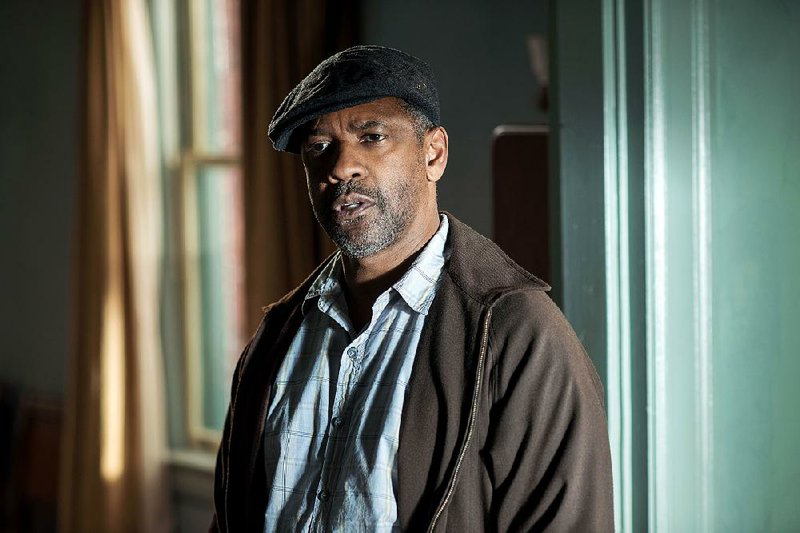Before we get into the review proper, let's stipulate a few things about Denzel Washington's movie adaptation of August Wilson's play Fences.
First of all, this is a worthy undertaking. Fences is a great American play, one with which every citizen ought to be familiar. The illiterate Negro Leagues baseball player cum garbageman Troy Maxson should be as familiar to us as Willy Loman or Ralph Cramden or Fred Flintstone or Babe Ruth; every one of us ought to carry in our heads an image of this heroic and damaged character. To the extent that Washington's movie will expose a great many people -- some for the first time -- to the late playwright's work, Fences is an important and laudable film.
Fences
88 Cast: Denzel Washington, Viola Davis, Stephen Henderson, Jovan Adepo, Mykelti Williamson, Russell Hornsby
Director: Denzel Washington
Rating: PG-13, for thematic elements, language and some suggestive references
Running time: 2 hours, 18 minutes
Secondly, Washington is one of our finest actors and this role -- which he played on stage -- is one of his best. He has the part down and he has a deep understanding of the man, his contradictions and hypocrisies. As a man who feels he was born with two strikes and therefore must do whatever is necessary to protect home plate, Washington delivers a towering, booming performance that feels precisely calibrated and utterly offhand.
Thirdly, the cast with which Washington has populated the film -- most of whom are reprising their roles from the Broadway revival -- are uniformly excellent. Viola Davis and Stephen Henderson are especially impressive, since their characters are the sort of characters of pure theater who tend to feel stagey and contrived when the plays they live in are -- as they say in Hollywood when they want to induce cringing-- "opened up" into cinema because they are able to retain their vitality and transpose the gestural style of the stage into a tighter, less emphatic key.
There are plenty of reasons to see Fences and no reason not to other than the preservation of the memory of this same cast running these same lines on stage. And since most of us -- me included -- didn't see Washington play Maxson on Broadway, most of us should probably make an appointment.
But it should be noted that plays and movies are different languages and for reasons that have more to do with conception than execution, one cannot always be perfectly translated into the other. One of the things you have in a play that you don't necessarily have in a movie is the immediate sense of being in a room with the characters. The dynamics of Troy's rage -- his looming emptiness -- play differently on stage than they do in two dimensions on a wall. And this shift matters, for as magnetic as Washington's performance is, it doesn't have the inescapable quality it might have if we were trapped in a space with him.
The play, set entirely in the Maxsons' backyard, consists of a series of dialogues between Troy and other characters, with most major events happening off-stage. The film is faithful to this conceit, but Washington allows the action to flow through the house and even to accompany Troy on his rounds or downtown to a meeting with a supervisor over a work grievance. While this all is done competently, Washington's strengths as a director understandably have more to do with working with actors than setting up visually interesting shots. He occasionally pulls off a surprising sequence, as when the camera remains static as Troy throws a tantrum in the kitchen, then storms out the front door, diminishing himself with every step.
Also, while Wilson's dialogue is brilliant, the speeches push the length of the film past two hours, into award-seeking territory. Maxson's friend Bono (Henderson) seems to be perpetually telling us he has to leave, but he rarely achieves escape velocity and it doesn't take us long to realize that's exactly the point. Similarly, the central metaphor -- the fence Troy spends much of the movie building at his wife, Rose's (Davis), request -- feels strangely heavy-handed.
Still, this is remarkable, powerful stuff that's only somewhat diluted by the necessary compromises movies demand of plays. While its highest purpose may be the archiving of Washington's and Davis' performances in a great American play, it also serves as a good introduction to Wilson's world, the America of the '50s Pittsburgh he grew up in and the wider tragedy of men like Troy who, robbed of their own dreams, felt compelled to govern those of others.
MovieStyle on 12/23/2016
